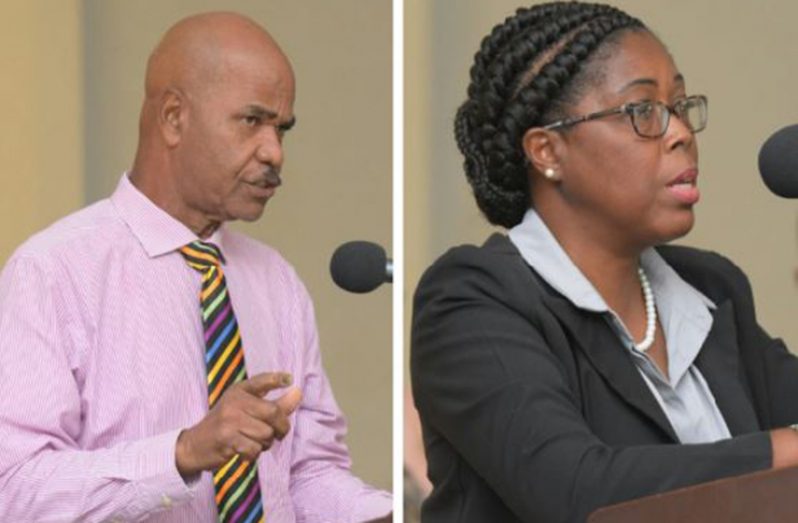…consumer body, residents were up in arms against proposed move
THE Guyana Telephone and Telegraph Company Limited (GTT) on Monday withdrew its application before the Public Utilities Commission (PUC) to discontinue providing public pay phones services in 18 areas.
Several public-spirited persons and representatives turned up at the meeting at the Duke Lodge on Monday, ready to argue against the company’s move which they first requested back in October. However, before the Commission could hear submissions from persons in attendance, the GTT Legal and Regulatory Affairs Director Mark Reynolds announced, that the company was withdrawing the application.
PUC Chairman Dela Britton confirmed that she had received an email the day before from the GTT announcing that they were cancelling that application. “We’ve looked at it on a broader context and there needs to be further consideration given to the service, and as such we withdraw it on that basis,” Reynolds declared.
In the application first seeking to remove the service, GTT had noted that it was operating at a loss to upkeep the 36 public call boxes that were still in service. GTT says for 2017 only 18 of the 36 pay phones made money, totaling $1,815,172, while the company spent some $10,713,000 in costs to keep the pay phones operational. Two main pay phones generated most of the income. The phone located at Develdt Benab, Upper Berbice River made $1, 185,934 in 2017, while a pay phone at Gateroy Benab made $569, 726. As such the company was seeking to cease operation at these 18 pay phones. However they have now reconsidered, noting GTT’s corporate obligations to providing universal services to the public.

Following the application, the Guyana Consumer’s Association (GCA) had written a response to the PUC challenging GTT’s right to discontinue the service in the locations. The GCA welcomed the announcement of the withdrawal and registered their hopes that it is not brought back in the future.
It was said that in many of the areas the pay phones are the communities’ only means of communicating with the coastland. Eight out of the 18 areas listed for removal has no cellphone service, one has only marginal cellular coverage. Moreover, it was noted that GTT itself contributes to the low income of some of the pay phones as some of the phones do not work for months at a time.
The pay phone at the Kaieteur National Park was one of those on the list to be removed. But it is the primary means of communication between persons located in the area and persons on the coastland.
Given that the Protected Areas Commission (PAC) pays out-of-pocket to fly GTT personnel up to the Kaieteur Park to service the pay phone, doing so as recent as last August, Commissioner Denise Fraser was taken aback that the PAC was not even notified about plans to cease the service. “That is the thing that I was mad about, that we would discover this by accident, and they know that this is a critical service at Kaieteur, we have staff there without that phone we’re cut off,” Fraser argued.
“God forbid that there’s any kind of emergency, even the airlines depend on the phone to call get the weather, figure out flights and so on. There’s no cell phone service there so that phone is the only means of communication.”
Clayton Hinds came out to Monday’s meeting to represent the interest of the people of Bara-Cara Benab. After hearing of GTT’s application to remove the phone, he made a special effort to go into the area and see what the situation was like on the ground.
The community was not aware that plans were afoot to take the service away from them.
“They don’t know because it was just in the papers and normally the radio and television system there is not so effective, so they don’t know. It was sheer curiosity on my part that caused me to see it and seeing it I decided to go there. They don’t know about the application, but I know so I came to represent their interest,” Hinds explained.
They were all happy to hear the news of the withdrawal.
Reynolds acknowledged GTT’s corporate responsibility to provide communications services in areas with little options.
“It is heartening to hear that there are so many persons coming out in support of the service. I can tell you that at GTT we are committed to investing in the country of Guyana, and even despite what is said in the media, we do have a vested interest in ensuring there is communication. There are plans a foot but these things take time,” Reynolds said.
Going forward, however, he hopes to see more collaboration to ensure the provision of such vital services to such areas.
“It really has to be a collaborative effort, it’s not meant for GTT to carry it by themselves. We have certain obligations to universal services which should not be only incumbent on not only GTT, but other service providers that are existing and also on the government. We need to have stronger collaboration in terms of ensuring that the persons in the hinterland areas and outside of Georgetown receive services. So it has to be a collaborative approach between the government and the service providers,” Reynolds said.




.png)









